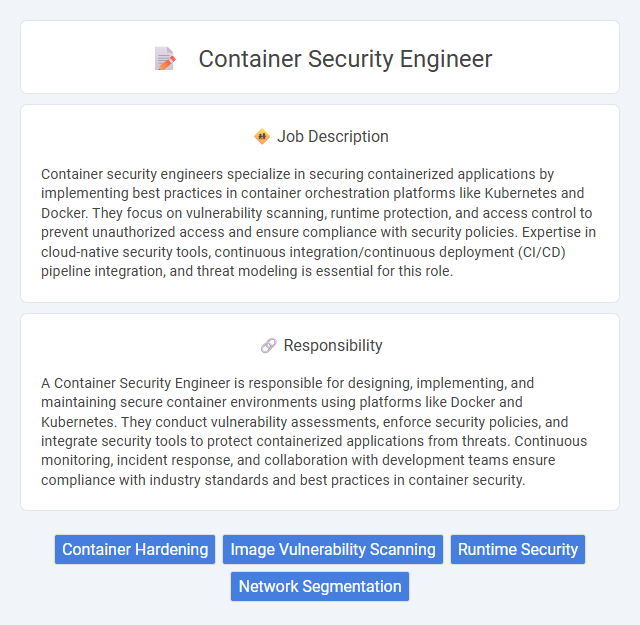
Container security engineers specialize in securing containerized applications by implementing best practices in container orchestration platforms like Kubernetes and Docker. They focus on vulnerability scanning, runtime protection, and access control to prevent unauthorized access and ensure compliance with security policies. Expertise in cloud-native security tools, continuous integration/continuous deployment (CI/CD) pipeline integration, and threat modeling is essential for this role.
Individuals with strong problem-solving skills and a background in cybersecurity or software development will likely thrive as Container Security Engineers. Those comfortable working in fast-paced, detail-oriented environments and staying updated on emerging threats and technologies may be well-suited for this role. Candidates who prefer routine tasks over dynamic challenges might find this job less compatible with their strengths and preferences.
Qualification
Container security engineers require deep expertise in Kubernetes, Docker, and container orchestration platforms, alongside proficiency in security tools like Falco, Aqua Security, and Twistlock. Strong knowledge of CI/CD pipelines, vulnerability management, and secure software development lifecycle (SSDLC) practices is essential. Certifications such as Certified Kubernetes Security Specialist (CKS) and Certified Information Systems Security Professional (CISSP) enhance qualifications and demonstrate advanced security skills.
Responsibility
A Container Security Engineer is responsible for designing, implementing, and maintaining secure container environments using platforms like Docker and Kubernetes. They conduct vulnerability assessments, enforce security policies, and integrate security tools to protect containerized applications from threats. Continuous monitoring, incident response, and collaboration with development teams ensure compliance with industry standards and best practices in container security.
Benefit
A Container Security Engineer likely enhances organizational security by implementing robust container protection strategies that reduce vulnerability risks and potential breaches. This role probably improves deployment efficiency and consistency through automated security practices, leading to faster, more secure software delivery. The position may also contribute to regulatory compliance and audit readiness, safeguarding company reputation and customer trust.
Challenge
Container security engineer roles likely involve complex challenges related to safeguarding containerized applications from evolving cyber threats. These professionals probably face difficulties in managing vulnerabilities across diverse container environments and ensuring robust compliance with security policies. The dynamic nature of container orchestration and frequent updates may increase the complexity of maintaining continuous security monitoring and incident response.
Career Advancement
Container security engineers specialize in securing containerized applications by implementing robust security measures, vulnerability assessments, and continuous monitoring. Mastery of Kubernetes security, DevSecOps practices, and cloud-native security tools enhances prospects for advancement to senior security architect or cloud security leadership roles. Expertise in compliance frameworks and automation of security policies drives growth toward roles such as security consultant or container security manager.
Key Terms
Container Hardening
A Container Security Engineer specializing in Container Hardening implements advanced security measures to protect containerized applications from vulnerabilities and attacks. This role involves configuring container runtime environments, enforcing strict access controls, and applying security policies tailored to platforms like Docker and Kubernetes. Expertise in vulnerability scanning tools, image signing, and continuous monitoring ensures robust defense against potential threats and compliance with security standards.
Image Vulnerability Scanning
Container Security Engineers specialize in protecting containerized applications by conducting Image Vulnerability Scanning to identify and remediate security risks in container images before deployment. They utilize advanced tools like Clair, Trivy, and Aqua Security to automate the detection of vulnerabilities, misconfigurations, and compliance issues within container images. Ensuring continuous monitoring and integration of security practices into CI/CD pipelines minimizes the attack surface and strengthens overall container security posture.
Runtime Security
A Container Security Engineer specializing in Runtime Security ensures the protection of containerized applications during execution by monitoring and mitigating threats such as unauthorized access, privilege escalations, and runtime vulnerabilities. They utilize tools like Falco, Aqua Security, and Sysdig Secure to enforce real-time security policies and detect anomalous behaviors in container environments. Expertise in Kubernetes, Docker, and container orchestration security controls is essential for minimizing attack surfaces and maintaining compliance with security standards.
Network Segmentation
A Container Security Engineer specializing in Network Segmentation designs and implements micro-segmentation strategies to isolate containerized applications, minimizing attack surfaces and preventing lateral movement within cloud-native environments. They leverage tools like Kubernetes Network Policies, Istio service mesh, and Calico to enforce granular traffic controls between containers and namespaces. Continuous monitoring and automated compliance checks ensure that network segmentation policies adapt to dynamic container orchestration, enhancing the overall security posture of container deployments.
 kuljobs.com
kuljobs.com